Sports
Can Stephen Curry carry the Golden State Warriors if Jimmy Butler's injury lingers?

Sports
Longtime Utah volleyball coach Beth Launiere retires – Deseret News
Beth Launiere, the longest-tenured volleyball coach in Utah history, has retired, the school announced Monday.
Over 36 years as Utah’s coach, Launiere amassed 689 wins and took Utah to the NCAA tournament 20 times.
With Launiere in charge, the Utes won six Mountain West titles and advanced to the Sweet 16 four times, most recently in 2019.
“After 36 years as the head volleyball coach at the University of Utah, I have made the difficult decision to announce my retirement,” Launiere said in a school press release.
“While it is not easy to walk away from a lifetime’s work, I am ready and excited to begin the next chapter of my life. Thank you to the hundreds of players whom I have had the privilege to coach, and the many assistant coaches, support staff and administrators who were my daily collaborators to build this program into what it is today.
“I will miss the daily interactions, but I know our relationships will last a lifetime. It has been an honor to represent one of the greatest universities in the country. I will forever love Utah and will always be a Ute!”
Utah was ranked in the AVCA Coaches Top 25 poll for 183 weeks under Launiere’s leadership, and the program produced 16 All-Americans.
During her 36-year career at Utah, Launiere was rewarded with three Mountain West Conference Coach of the Year awards and one Pac-12 Coach of the Year award in 2019.
In her final season, Launiere and the Utes made the NCAA Tournament, finishing the season with a 15-15 record with wins over No. 23 BYU and No. 13 Kansas before losing to the University of Northern Iowa in the first round of the NCAAs.
Launiere will leave a lasting legacy as the volleyball program’s greatest coach.
Utah athletic director Mark Harlan wasted no time naming her successor, appointing Alyssa D’Errico as the sixth head coach in program history.
“Alyssa D’Errico is a tremendous identifier of talent and is elite in developing student-athletes and building genuine relationships,” Harlan said. “With her championship pedigree, All-America playing experience, and the three years she has spent at the University of Utah as associate head coach, she is uniquely equipped to take over leadership of our volleyball program.
“I’m thrilled to appoint Alyssa as our new head coach, and excited to see her establish herself as this program’s leader, building on the legacy that Beth Launiere has built.”
D’Errico is a three-year assistant of Launiere’s, joining the program ahead of the 2023 season.
“I want to sincerely thank Mark Harlan, Charmelle Green and Jason Greco for their trust and support in giving me this opportunity to lead Utah volleyball,” said D’Errico in a press release.
“Of course, I also must thank Beth Launiere. I am deeply grateful to Beth for bringing me out here to be a part of this incredible volleyball program and athletic department. Her countless contributions to our sport, her care for the athletes, and the legacy she leaves behind are inspiring — truly leaving the program better than she found it.
“As I step into this role, I am honored and energized to help guide our program into the next era, with new heights in sight and a strong vision for sustained excellence. I look forward to building on our foundation, elevating our competitive standard, and fostering a culture where our student-athletes thrive on and off the court.”
Sports
Nevada volleyball’s team leaders in kills, assists and digs enter the transfer portal
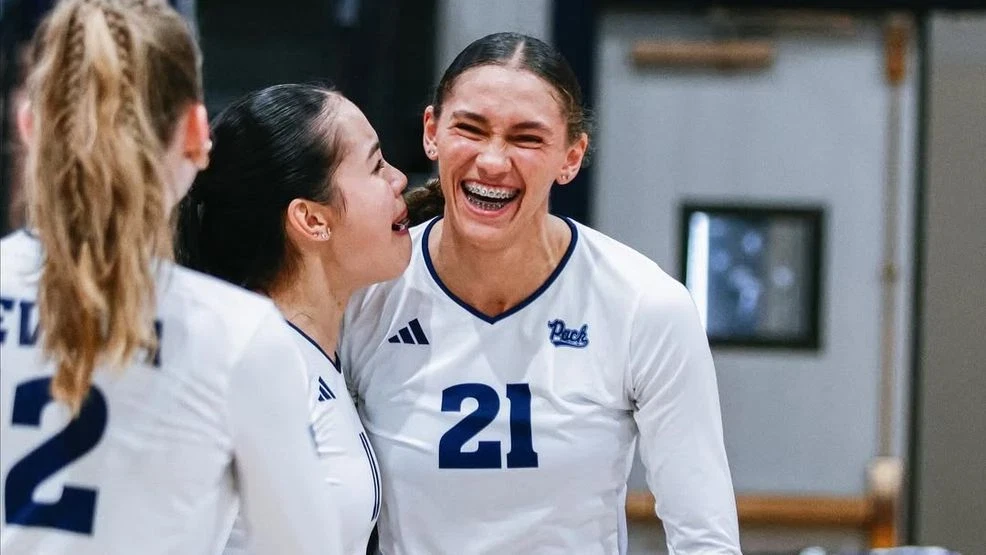
The Nevada volleyball team’s leader in kills (Haylee Brown), assists (Audrey Jensen) and digs (Kinsley Singleton) all entered the transfer portal Monday, as reported by College Volleyball Transfers and shared by those players on Instagram.
Brown was an All-Mountain West honorable mention selection in 2025 after transferring to Nevada following two seasons at Georgia Washington. The 6-foot-2 outside hitter from Maricopa, Ariz., hammered 351 kills, which were 165 more than the team’s second most. She led the Wolf Pack with 374 points and added 36 blocks. Brown will have one season of eligibility remaining at her next school.
Jensen was Nevada’s top freshman and starting setter, racking up a team-best 658 assists (391 more than second place) and adding 63 kills, 49 blocks (third on team), 203 digs (second on team) and 26 services aces (second on team). The 6-footer from Parker, Colo., was one of the Mountain West’s top rookies and started a team-high 27 of 28 matches for Nevada, racking up 116 points. She will have three seasons of eligibility remaining at her next school.
Singleton is a 5-4 libero from Phoenix who led Nevada with 361 digs while adding 104 assists. The defensive specialist also had a team-best 28 service aces and was one of Nevada’s top players each of the last two years. She will have two seasons of eligibility remaining at her next school.
Nevada volleyball has struggled with player retention for several seasons and lost stars Gabby McLaughlin and Tehya Maeva to Syracuse last season with McKenna Dressel also transferred to Mississippi State. The Wolf Pack went 8-20 overall and 4-14 in the MW this season, ranking 11th out of 12 schools under second-year head coach Shannon Wyckoff-McNeal.
With the transfer departures, Nevada would retain just one of its top-five players last season in matches started in sophomore-to-be Kamryn Tifft, whose 20 starts were the fourth most on the team.
Sports
Adrian College SID, Mike Prang, Earns Distinguished CSC 30 Under 30 Recognition
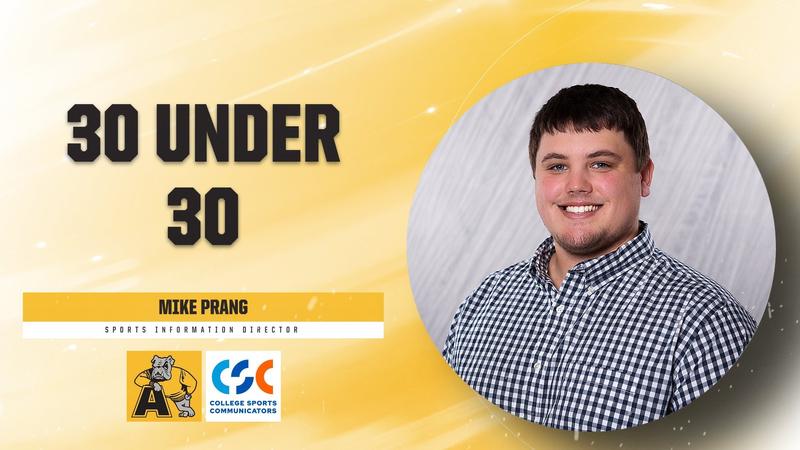
GREENWOOD, Ind. — College Sports Communicators announced its 30 Under 30 Class of 2025 on Monday afternoon, naming 30 of the nation’s top collegiate athletic communicators under the age of 30 to its recipient’s list. Landing his name on the list is Adrian College’s own, Mike Prang, who serves as the Sports Information Director, leading the charge for all 53 athletic programs in the department for the last 5+ years.
The annual honor recognizes emerging athletics communications professionals at all levels of college sports in strategic, creative, and digital spaces.
“We are proud to recognize and honor the rising talent and amazing achievements of so many incredible individuals with the latest 30 Under 30 class,” said 2025-26 CSC President Patrick Crawford. “College Sports Communicators, at its core, is an organization that is driven by the strengths, skills and passions of its members. As new communicators join our ranks and begin to build their careers, we are fortunate to take this opportunity to celebrate the best of CSC’s young professionals. This class is representative of both the diversity of our membership and the breadth of our overall community. Congratulations to this year’s honorees.”
The 28-year old from Carol Stream, Illinois attended Loras College in Iowa, where he studied Sport Management, worked as an Athletic Communications student-worker, and played on the varsity Baseball team. Prang graduated in the Fall of 2019 before relocating up to Michigan where he joined the Bulldogs’ Athletic Communications staff shortly after in December 2019.
Mike first began his tenure at Adrian as the Assistant Sports Information Director, where he assisted in athletic communication operations for just over a year before he was promoted to the head Sports Information Director role in March 2021. Since then, Mike has been stewarding the operations of the largest Athletic Department in the nation, overseeing the everyday tasks of covering 53 athletic programs, from graphic design to social media and statistics among other duties.
During his time as a Bulldog, Mike has traveled to four NCAA Division III Frozen Fours and two National Championship games, as well as the 2021 NCAA DIII College World Series. His experience also includes attending three NCAA DIII Baseball Regionals, hosting one Regional, and traveling to a Super Regional. He has hosted four NCAA Men’s Wrestling Regionals—two at Loras and two at Adrian—along with one Women’s Wrestling Regional and two Women’s Wrestling National Championships. Additionally, he traveled to the NCAA DIII Women’s Golf National Championship and has hosted six NCAA DIII Tournament Hockey games. His work has taken him to a Men’s Rugby National Championship, an NCAA DIII Track & Field Championship, and three NCAA Tournament Men’s Basketball games, including two at Loras and one for Adrian. He also served as the official scorer for the 2019 NCAA DIII Women’s Volleyball National Championship (Final 8) and has covered two Bass Fishing National Championships. Mike has also been around for three ACHA Hockey National Championship victories at Adrian.
Mike handled the redesign of the adrianbulldogs.com website in 2021, reshaping the image of the department online. In addition, he has helped grow the department’s social media following, increasing the Instagram follower count by 6,000+, the Twitter follower count by 4,000+, and the Facebook follower count by roughly 3,500+ in just over five years. As the lead point of media contact for the department, Mike also works with local media outlets to promote Adrian Athletics through television and radio, including the likes of Adrian College TV, BCSN, 96.5 The Cave, and more.
“I’m truly honored to receive the CSC 30 Under 30 Award. This recognition reinforces my commitment to growing within the profession,” said Prang. “Working with 53 athletic teams at Adrian College has been both challenging and incredibly rewarding. The success of our teams and student-athletes, along with the relationships I’ve built with them, continues to motivate me every day. Thank you so much to those who nominated me for the award, and to those who have helped me grow into the SID that I am today. I can’t take all the credit for this honor. I’m incredibly thankful for every member of the Adrian College Sports Information staff, past and present. To our student workers and interns, thank you for all you do. I couldn’t do my job the same without you.”
To bolster his resume, Mike is a two-time D3SIDA Regional SID of the Year nominee and an active member of the College Sports Communicators Young Professionals Committee (YPC), where he also serves on the YPC Programming Subcommittee. In the summer of 2024, he was selected as a speaker for the CSC U-Summit. Additionally, he contributes to institutional recognition efforts as a member of the Adrian College Athletic Hall of Fame Committee.
“I’m excited to keep growing Adrian College Athletics and to continue sharing the stories and promoting the amazing teams and student-athletes who proudly call themselves Bulldogs,” added the newest 30 Under 30 recipient.
Adrian College congratulates Mike Prang on this prestigious honor and extends their gratitude for everything Mike continues to do for the Athletic Department. He will be honored at the 2026 CSC Convention in Las Vegas next summer.
Sports
D’Errico Named Head Coach of Utah Volleyball Program
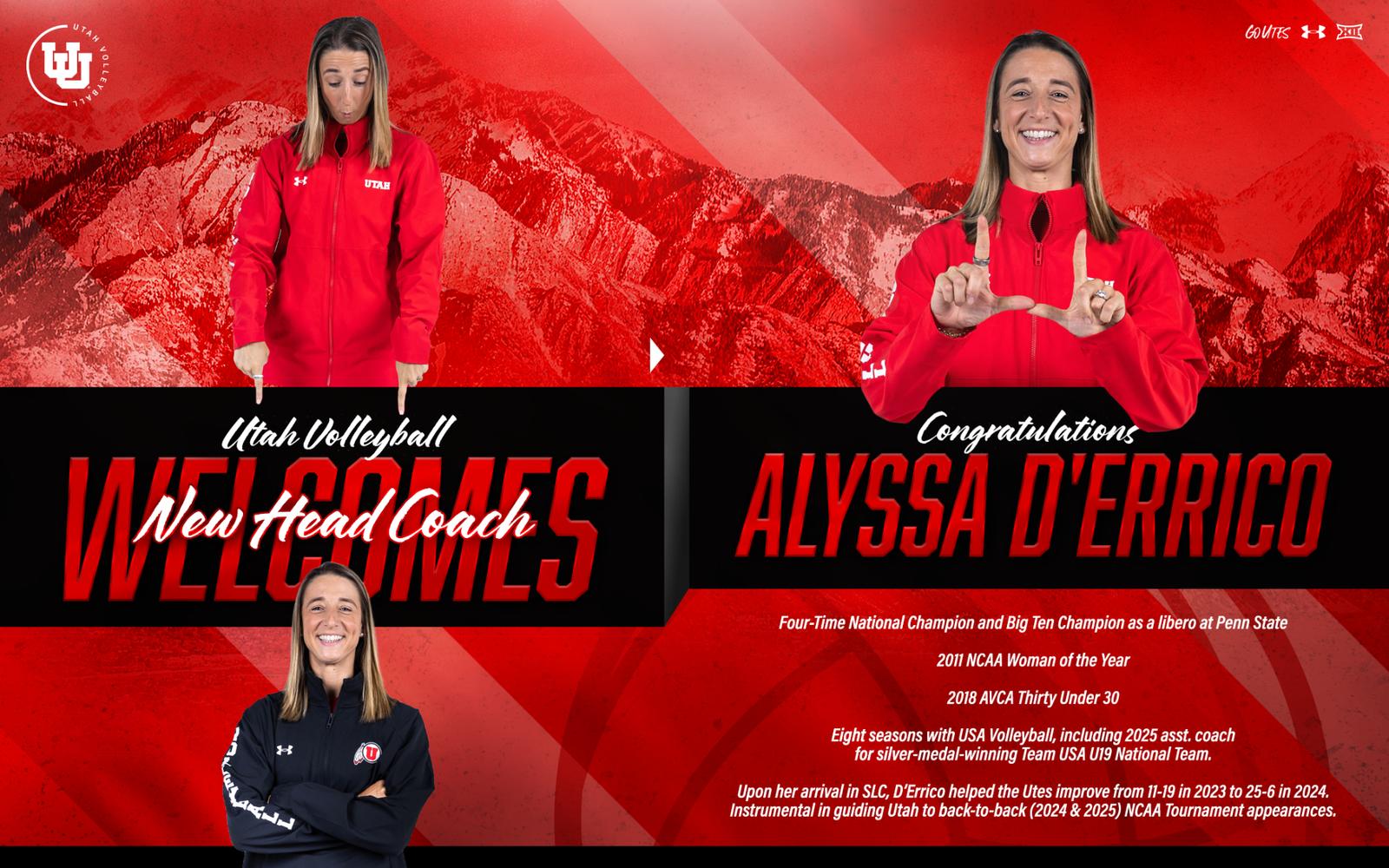
A press conference to introduce D’Errico and celebrate Launiere’s career is scheduled for Wednesday, Dec. 10, at 3 p.m., at Crimson Court.
“Alyssa D’Errico is a tremendous identifier of talent and is elite in developing student-athletes and building genuine relationships,” Harlan said. “With her championship pedigree, All-America playing experience, and the three years she has spent at the University of Utah as associate head coach, she is uniquely equipped to take over leadership of our volleyball program. I’m thrilled to appoint Alyssa as our new head coach, and excited to see her establish herself as this programs’ leader, building on the legacy that Beth Launiere has built.”
Through three seasons in Salt Lake City, D’Errico has made her presence known, helping the Utes improve from an 11-19 record in 2023 to 25-6 in 2024, including a return to the NCAA Tournament for the 19th time and a final AVCA ranking of 23rd. She helped guide Utah to its 20th NCAA Tournament appearance in 2025. Primarily responsible for the defense, D’Errico has overseen all scouting and training concerning that side of the net, as well as Utah’s serve/receive strategy.
“I want to sincerely thank Mark Harlan, Charmelle Green and Jason Greco for their trust and support in giving me this opportunity to lead Utah Volleyball,” said D’Errico. “Of course, I also must thank Beth Launiere. I am deeply grateful to Beth for bringing me out here to be a part of this incredible volleyball program and athletic department. Her countless contributions to our sport, her care for the athletes, and the legacy she leaves behind are inspiring—truly leaving the program better than she found it. As I step into this role, I am honored and energized to help guide our program into the next era, with new heights in sight and a strong vision for sustained excellence. I look forward to building on our foundation, elevating our competitive standard, and fostering a culture where our student-athletes thrive on and off the court.”
D’Errico came to Utah after six seasons on the staff at Dayton. Hired in 2017, she was promoted to associate head coach in 2019, and served as the program’s recruiting coordinator. D’Errico specialized in the blocking and defensive efforts for the Flyers, while also being involved in all aspects of recruiting and program-wide decisions. She helped guide Dayton to two A-10 regular season championships (2020, ’21) and four A-10 Tournament championships (2018-21). Additionally, the Flyers saw two athletes earn A-10 Libero of the Year honors under D’Errico’s watch while coaching four All-Americans and leading the Dayton defense to a top-30 ranking in 2020 and ’21. D’Errico’s astounding early efforts as a coach was recognized by the AVCA in 2018 as part of its Thirty Under 30 honorees.
D’Errico began her coaching career at Louisville from 2015-2016, where she was instrumental in helping the Cardinals to their first ACC Championship shortly after her arrival, and coaching 2015 ACC Defensive Player of the Year and Freshman of the Year Molly Sauer.
“I couldn’t be more pleased for Alyssa D’Errico to be named the next head volleyball coach at the University of Utah,” said Beth Launiere. “She has great knowledge of the game, and a work ethic second to none. Alyssa is a leader who invests in her players in both time and care, and is a tremendous role model for young women. Her exceptionalism as a four-time NCAA Women’s Volleyball National Champion was a prelude to her extraordinary attributes as a coach and what she brings to the profession. I have no doubt Alyssa will maintain the culture we have strived to create and continue Utah Volleyball’s winning tradition.”
D’Errico’s competitive spirit became immediately apparent during her impressive college career at Penn State as a member of four Big Ten championship and national championship teams from 2007-2010 where she served as team captain for three of those seasons. She is the only player in NCAA Division I volleyball history to have won four national championships after winning state championships in her last three years of high school.
The 2010 All-Big Ten honorable mention selection was a member of the Nittany Lions’ record-setting 109- match win streak, and won 24-straight NCAA tournament matches through her four seasons in Happy Valley. D’Errico amassed 1,245 career digs, 146 career aces, and was named the 2011 NCAA Woman of the Year to wrap up her illustrious collegiate career.
After graduating, D’Errico placed her sights on Europe, playing three seasons overseas as a libero with stops in Spain, Croatia and France. During her professional career, D’Errico was the MVP of the Princess Cup, a four-time Superliga weekly MVP, and a “Super 7” All-League honoree with the Feel Volley Alcobendas Club in Spain.
D’Errico is not only accomplished as a college coach, but has built an extensive resume with USA Volleyball, having spent eight years with the organization in various roles including serving as an assistant on the 2020 Youth National Team, an assistant coach for the U17-U18 National Team Development Program summer training series in 2023 and 2024, an assistant coach for the U17-U18 NTDP spring training series in 2024, the head coach for the U18-U20 NTDP spring training series in 2025, and the U.S. Women’s National Team Open Program evaluator in 2025. Most recently, D’Errico served as an assistant coach for the 2025 U19 National Team that took home the silver medal at the World Championships this past summer.
WHAT OTHERS ARE SAYING ABOUT ALYSSA D’ERRICO
Penn State Head Coach Katie Schumacher-Cawley:
“I am absolutely thrilled for Alyssa and for Utah Volleyball. She is stepping into a program built on excellence under Beth, and there is no doubt she will honor that foundation while elevating it even further. Alyssa’s energy, passion, and unwavering commitment to doing things the right way will only strengthen the culture and push the program to new heights.
She has always led with heart, humility, and an incredible competitive drive, and Utah is gaining not only a great coach but an even better person. I couldn’t be happier for her and for the bright future ahead.”
Former Penn State Head Coach Russ Rose:
“Alyssa arrived at Penn State with terrific skills, natural leadership and confidence, and she graduated with four Big Ten and four National Championships on her resume. She received numerous academic and athletic awards, and was always committed to the University, the team and its members.
After a brief professional playing career, Alyssa entered the coaching track and experienced great mentoring at Louisville with Anne Kordes, at Dayton with Tim Horsman, and then of course with Beth Launiere at the University of Utah. At each of her stops she gained not only meaningful experience, but the benefits of working with elite coaches.
I’m confident that Alyssa will continue to excel and build on the exceptional tradition established by Beth, and I expect to see great things in the future.”
Dayton Head Coach Tim Horsmon:
“I’m really excited for Alyssa to get this opportunity as the head coach of the Utah program. Utah made a great hire. She’s won as a player, winning four national championships, and she continues to win as a top-25 coach.
I’m not sure I’ve been around someone so passionate about this sport or our profession. Alyssa is smart, hard-working and connects with her players on and off of the court. She is a real pro, and more importantly a great human being who demonstrates great character in all things she does. I couldn’t be happier for one of my favorite people in this world.”
Minnesota Head Coach Keegan Cook:
“Congratulations to the University of Utah on the hiring of Alyssa D’Errico. Simply put, there is no one better prepared or more capable of seizing this opportunity than Alyssa. The Utes have ensured that the legacy of leadership and championship-caliber coaching at the University of Utah will continue.”
Michigan State Head Coach Kristin Kelsay:
“I can’t think of anyone better than Alyssa D’Errico to lead the Utah Women’s Volleyball Program. Alyssa is a champion on and off the court and will lead the Utes with character, integrity, and her competitive fire. Alyssa’s passion to grow the game of volleyball and her relational leadership will mentor, guide, and challenge the student-athletes in her program. I am so excited for this next chapter of Utah Volleyball with Alyssa at the helm”
Oregon Head Coach Trent Kersten:
“Huge congratulations to Alyssa D’Errico on being named the head coach at University of Utah. She’s a phenomenal coach and an even better person. Beth built an incredible foundation there, and Alyssa is the perfect leader to honor that legacy while putting her own stamp on the program. I’m excited to see Utah Volleyball thrive under her leadership.”
GENERAL ADMISSION TICKETS FOR 2026 UTAH VOLLEYBALL AVAILABLE NOW
https://utahutes.evenue.net/events/VBNS
FOLLOW THE UTES
For an inside look at the Utah Volleyball program, including tournament, roster and news updates, fans can follow the Utes on social media (Twitter: @UtahVolleyball | Instagram: @utahvolleyball).
DOWNLOAD THE OFFICIAL MOBILE APP OF THE UNIVERSITY OF UTAH TODAY – UTAH 360
Sports
The Return of “Rocket”: Noah Taitz’s Journey From the Sideline to Center Stage
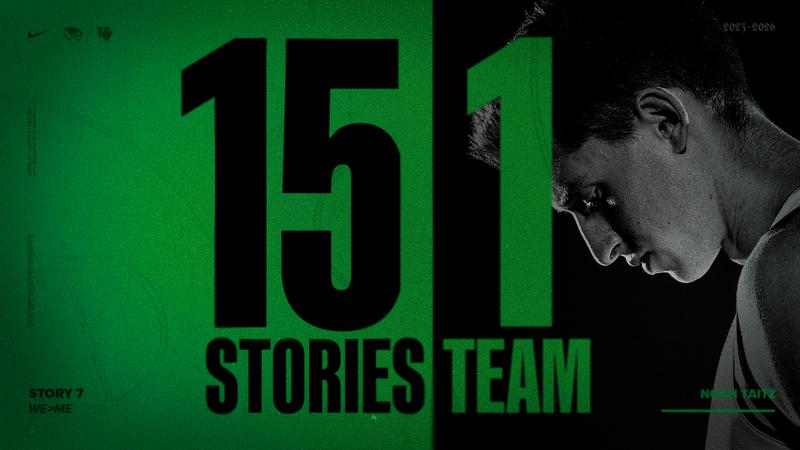
By Jason Erickson
Noah Taitz walked into college basketball with a clean jumper, four state titles from Bishop Gorman, and a future that seemed to be pointing straight upward. He will leave it as someone very different. Six years reshaped him in ways he never expected. Those years were filled with stops and starts, injuries, uncertainty, growth, and eventually a sense of peace he was not sure he would ever find again. His final season at Utah Valley is not just a closing chapter. It is the first one in a long time that feels whole.
His college career began under circumstances no freshman could have prepared for. Taitz arrived at Stanford in September of 2020, right as the pandemic turned everything upside down. Instead of meeting new classmates or walking around campus, he spent seven months inside a strict bubble. There were no fans in the arena, no in person classes, daily testing, and very little social life. “My freshman year was brutal… depressing,” he said. “I worked so hard to get there, and my first impression was like, this place is horrible.” His sophomore season brought moments that felt a little more normal, but something still felt off. His role on the team was not evolving, and the environment never fully settled for him. After two seasons, he made the difficult choice to leave.
The move to LMU looked perfect at first. Sunshine, a beautiful campus, and friends everywhere he turned. But basketball nearly disappeared from his life. A calf strain from Stanford, which once seemed manageable, unraveled into something far more complicated. Hoping to speed up his recovery, he tried a series of aggressive treatments that instead pushed him backward. Even simple things like climbing stairs triggered painful spasms in his calves. “I literally had doctors not sure if I would ever play again,” he said.
Even then, he kept showing up. He attended every practice, every film session, and every meeting. He could not play, but he refused to walk away. Progress came in slow, almost invisible steps that were just enough to keep him believing. Nearly two full years passed before his body finally started to respond. Looking back, he says that stretch of life hardened something inside him. “It taught me mental toughness,” he said. “If I could get through that, I can get through anything.”
A real turning point arrived in the summer of 2024. Back home in Las Vegas, he trained every day with Charles Sams, a trainer who understood exactly how hard to push and when to ease off. It was the first time in years Taitz genuinely felt himself coming back.
Returning to Las Vegas meant more than training. It meant time with the people who keep him grounded. Both of his parents live in Vegas, each remarried, and Noah is the older brother to three much younger siblings. His sisters, Victoria and Ella, are nine years old, and his brother, Travis, is seven. The age gap is so wide that he jokes he feels more like an uncle than a brother. The truth is that he is protective of them in a way that reveals how much he cares. Whenever he is home, he makes a point to visit both sides of the family. His siblings have grown up watching him from a distance, seeing their big brother on TV more often than seeing him at the dinner table. Being home reminded him why he kept fighting through the darkest parts of his injury. They were watching, and he wanted them to see him finish what he started.
Still not fully cleared, he entered the transfer portal on the final possible day. Utah Valley reached out and asked him to visit. He came to Orem, went through a workout, and caught fire in a shooting drill, hitting 23 of 25 threes. The staff saw enough. More importantly, they believed in him. “I was grateful they were willing to take a chance on me,” he said. “They knew I was not fully back yet, but they still believed.”
Utah Valley became exactly what he needed. For the first time since high school, he was healthy enough to be available for every game. “It was my first time winning at the college level,” he said. “My first time playing every game. First time really enjoying everything again.” A moment during the winter stands out in his mind. It was the first time he dunked comfortably in practice. Later, in the season opener, he drove baseline and hammered home his first in game dunk since January of 2022. His mom was in the stands. “She had not seen me do that since high school,” he said. “That was a cool moment.”
Ask what he hopes people think when they hear his name and he does not hesitate. “A good person. A good teammate. A winner,” he says. His teammates might describe him as meticulous or even obsessive about organization. He prides himself on knowing scouting reports cold and helping direct teammates even when he is not on the floor. “My composure is my biggest value to the team,” he said. “Guys can rely on me in those moments.”
His nickname, Rocket, goes back to eighth grade, when a skinny kid from Vegas kept surprising people with dunks. “The rocket emoji started flying around, and I just ran with it,” he laughs. His number, seven, is a nod to his hometown and to good fortune. It is also the first time in his college career that he has been able to wear it.
When he thinks about the wide eyed freshman who arrived at Stanford, he cannot help but smile. “I showed up a boy,” he said. “Now I am a man.” The injury forced him to take responsibility for every part of his health. Sleep, hydration, nutrition, supplements, all of it mattered. The time away also gave him a coach’s view of the game that now slows everything down for him.
After everything he has been through, the bubble, the injury, the doubt, and the slow climb back, this season carries a different kind of weight. The dream is simple. The NCAA Tournament. Utah Valley has never been. He has not either. “That is the ultimate goal,” he said. “It would be the first time in school history.”
And somehow, fittingly, the WAC Tournament will be played for the final time in his hometown of Las Vegas. “It feels like the stars have aligned,” he said. “Hopefully we are cutting down nets in Vegas.”
Six years. Three schools. One injury that nearly took the game from him. What remains is a player who refused to quit and a season that means more than anyone in the arena will ever know. He is ready for the moment he worked so long to reach. The Rocket is back and he’s ready for the moment he worked so long to reach.
Sports
The 16 remaining NCAA volleyball tournament teams, re-ranked
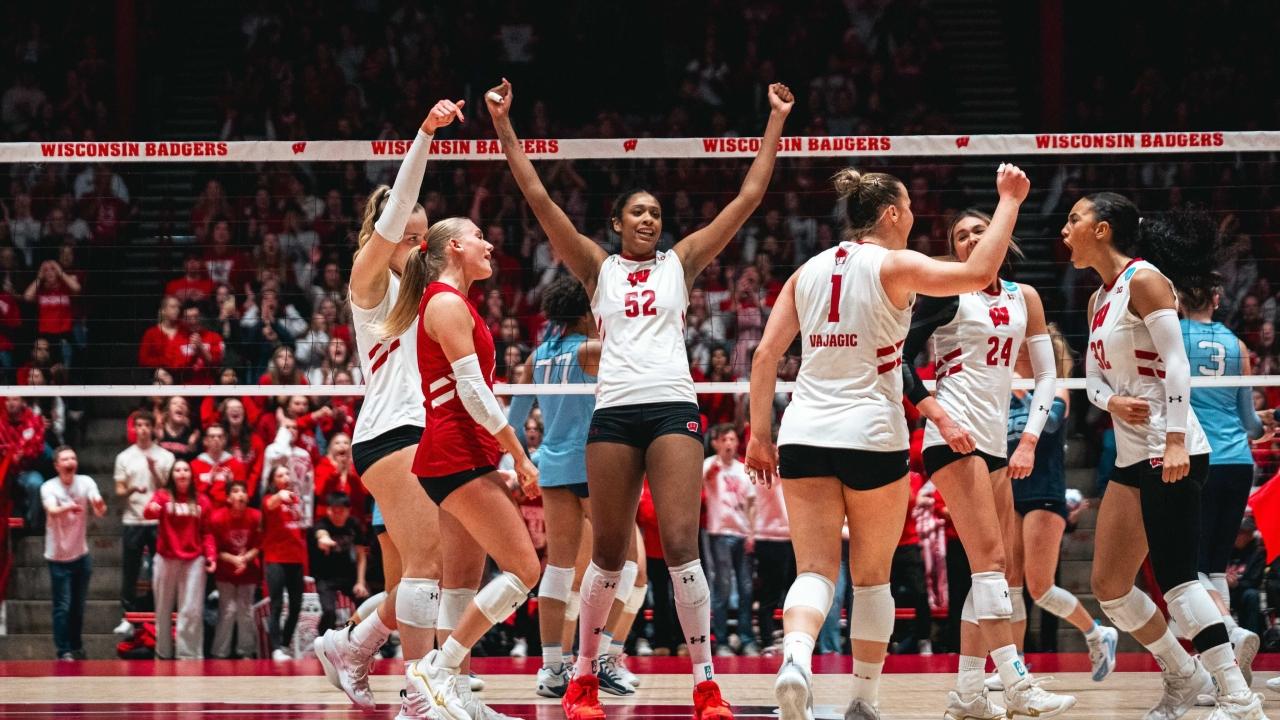
I re-ranked the remaining 16 teams in the NCAA women’s volleyball tournament. I took the original seeding made by the committee and re-ranked the teams based on tournament play only — not the entire season.
I am keeping the top 4 seeds the top 4 teams: Nebraska, Kentucky, Texas and Pitt.
No. 1 Nebraska
📝 CATCH UP: 2025 DI women’s volleyball tournament bracket, schedule, and scores
No. 2 Kentucky
Kentucky was the only team to drop a set in the first two rounds, but I decided not to move the Wildcats down a spot because UCLA was a strong contender.
No. 3 Texas
I was really impressed with Texas’ dominating sweep over Penn State. The Longhorns held PSU to nine points in the second set.
🤘 TEXAS FIGHT: Relive the Longhorn’s win over Penn State
No. 4 Pitt
No. 5 SMU
After Pitt, I have SMU at No. 5. The Mustangs showcased incredible performances early. They set an NCAA tournament record with a .618 hitting percentage in the first round, hit .370 in a sweep over Florida and looked impressive even after their star hitter Jadyn Livings went out with an injury.
No. 6 Wisconsin
I moved Wisconsin all the way up to No. 6, the biggest mover in my re-rankings. I think the Badgers are the hottest team in the country right now and look so dangerous with the return of Charlie Fuerbringer. They absolutely steam rolled through the first two rounds, even over a dark horse North Carolina team where they hit over .360. Mimi Colyer hit over .400 and the offense looked lights out.
DENIED UP TOP! ❌
📺 | ESPN+#OnWisconsin pic.twitter.com/KcJLwog0l6
— Wisconsin Volleyball (@BadgerVB) December 6, 2025
No. 7 Arizona State
After Wisconsin, I have Arizona State staying put in its original seed spot. The Sun Devils dropped a set to Utah State, so I didn’t move them up, but outside of that one set they handled the Aggies pretty handedly. I like how they have been spreading the offense out a lot more outside of just Noemie Glover.
🐴 WHO TO WATCH: Michella Chester’s darkhorses of the NCAA women’s volleyball tournament
No. 8 Texas A&M
I have Texas A&M jumping up a spot from its original seeding to No. 8. I liked how the Aggies looked against a strong TCU team, coming back from behind to close it out in four. I thought this team had the talent of a No. 2 seed all along, so I’m moving them up.
A rocket from Emily Hellmuth to end the set 🚀#NCAAWVB x 🎥 ESPN+ / @AggieVolleyball pic.twitter.com/FZguweY9qy
— NCAA Women’s Volleyball (@NCAAVolleyball) December 7, 2025
No. 9 Stanford
Stanford drops a bit from its original seeding after dropping a set in the first round to Utah Valley and one to Arizona in the second. The Cardinal are playing without Logan Parks, and it has made a big difference offensively.
No. 10 Louisville
Louisville also drops to No. 10 after surviving a five-set battle with Marquette. The Cardinals escaped with the win after falling behind two sets to one.
📺 WATCH: Louisville survives Marquette in a thriller
No. 11 Indiana
Indiana takes a jump from their original seeded to No. 11. They handled a strong Colorado team in a straight sweep which was really impressive. The Hoosier offense looks really efficient right now while running their quick tempo.
No. 12 Minnesota
Minnesota also moves up a spot with two sweeps through the first two rounds with outside Julia Hanson balling out. The Gopher freshmen are also looking really strong and are coming into their own at the right time of the season.
Julia Hanson this weekend:
36 kills on .500 hitting 🔥🔥🔥 pic.twitter.com/MAayQQauoL
— Minnesota Volleyball (@GopherVBall) December 7, 2025
No. 13 Purdue
I have Purdue at No. 13, around its original seeding after dropping just a set to Baylor in the second round.
No. 14 Creighton
Creighton takes a drop in the re-rank after getting pushed to five by Northern Colorado in the first round and playing a really close battle with UNI.
No. 15 Kansas
That leaves Kansas at No. 15. I was impressed by Kansas taking down Miami in four sets, so I moved the Jayhawks up a spot from their original seeding.
No. 16 Cal Poly
Finally, Cal Poly goes from unseeded to No. 16 after being the sole unseeded team to make the regionals. They are all around a great volleyball team and I am so excited to see them battle in Lexington.
👀 TAKE A LOOK: Greatest upsets in NCAA women’s volleyball tournament history
CAL POLY UPSETS (4) USC AND IS HEADED TO THE ROUND OF 16 FOR THE FIRST TIME IN 18 YEARS 😱#NCAAWVB x 🎥 ESPN+ / @CalPolyVolley pic.twitter.com/VTpSV4fGBe
— NCAA Women’s Volleyball (@NCAAVolleyball) December 6, 2025
-

 Rec Sports2 weeks ago
Rec Sports2 weeks agoFirst Tee Winter Registration is open
-

 Rec Sports2 weeks ago
Rec Sports2 weeks agoFargo girl, 13, dies after collapsing during school basketball game – Grand Forks Herald
-

 Motorsports2 weeks ago
Motorsports2 weeks agoCPG Brands Like Allegra Are Betting on F1 for the First Time
-

 Sports3 weeks ago
Sports3 weeks agoVolleyball Recaps – November 18
-

 Motorsports2 weeks ago
Motorsports2 weeks agoF1 Las Vegas: Verstappen win, Norris and Piastri DQ tighten 2025 title fight
-

 Sports2 weeks ago
Sports2 weeks agoTwo Pro Volleyball Leagues Serve Up Plans for Minnesota Teams
-

 Sports2 weeks ago
Sports2 weeks agoSycamores unveil 2026 track and field schedule
-

 Sports2 weeks ago
Sports2 weeks agoUtah State Announces 2025-26 Indoor Track & Field Schedule
-

 Motorsports2 weeks ago
Motorsports2 weeks agoRedemption Means First Pro Stock World Championship for Dallas Glenn
-

 Sports2 weeks ago
Sports2 weeks agoTexas volleyball vs Kentucky game score: Live SEC tournament updates


























































